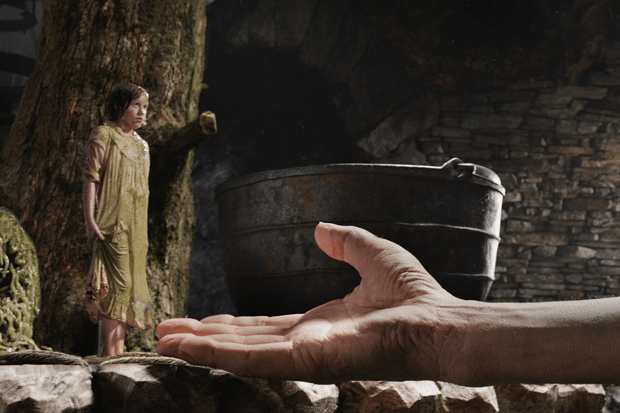Nobody who witnessed it can have forgotten Mark Rylance summoning giants to his aid in Jerusalem. As Johnny ‘Rooster’ Byron, drug-dealing roustabout threatened with expulsion from his little patch of Eden, Rylance roared and drummed until the theatre shuddered with the sound of gigantic stomps approaching. That colossal performance brought him to international — as in American — attention. The biggest giant to answer his call was Steven Spielberg. The world’s most successful living fabulist now won’t get out of bed for any other leading man.
We’ve already had Bridge of Spies, for which Rylance won an Oscar. There are two further Spielberg/Rylance collaborations on the runway. But for now, here comes The BFG, in which Rylance lends Rooster’s wurzelly vowels to the voice of Roald Dahl’s big friendly dreamcatcher.
This is a centenary celebration. Would the author have appreciated the birthday gift? Dahl’s antic stories for and about children have become box office in musical theatre, but cinema doesn’t quite know what to do with him: his last visit to the big screen was Tim Burton’s dismally claustrophobic Charlie and the Chocolate Factory. Until it opts for a weepier conclusion, this BFG is mostly faithful to the original — much more so than Spielberg’s Hollywoodisation of Hergé, which was basically Tintindiana Jones and the Doomed Template.
Fans of The BFG will recognise the story of Sophie, a young hyper-imaginative orphan girl who struggles with sleep. One night from the balcony of her orphanage in foggy London town she catches sight of a stealthy giant striding across the deserted Victorian cobbles. To prevent her revealing his existence, he steals her away to Giant Land, which here looks a bit like the Lake District enjoying a dry spell. It turns out the BFG is a vegetarian titch compared with his Brobdingnagian neighbours, a pack of ugly thugs whose fantasy snack is the flesh of human ‘beans’. Sophie’s wheeze to quash them once and for all involves enlisting the help of Her Majesty.
From the film’s Carrollesque lexicon and yokel conjugations (‘It be a troggle-humper’) you know you are in Dahl country. And yet the sense that you are also watching a Spielberg showreel is inescapable from the moment the BFG’s shadow first flits across a townhouse wall like a passing shark or raptor. The most overt forebear is E.T. the Extra-Terrestrial, whose scriptwriter Melissa Mathison adapted The BFG (she died last year and is the film’s dedicatee). Meanwhile those bullying giants adopt the predatorial behaviour patterns of their Jurassic or Martian stablemates, and are filmed as per. The scene in which Sophie and the BFG attempt to pass among their snoring bodies is a straight lift from Tintin. At times even Spielberg seems to be embarrassed about recycling his back catalogue quite so ecologically. The obligatory action sequences are no sooner started than brought to a hasty finish with a cough, a blush and an ‘anyway where were we?’
The real departure is not from Dahl but from Quentin Blake. His stringy illustrations are momentarily quoted, but Spielberg has opted for his own aesthetic: an alliance of live actors with the usual whizz-banging, paradigm-shifting, approval-seeking animations. The BFG’s cluttered lair comes up a treat — the estate of Heath Robinson should sue for a percentage of the box office. And there are beautiful painterly touches, especially in the mountaintop dreamcatching sequence in which the BFG and Sophie plunge, apparently, into the Wonderful World of Disney. (Once upon a time Uncle Walt started animating Dahl’s first book, The Gremlins.)
As for the actual acting, Ruby Barnhill plays Sophie as a perky northern miss in a dark bob and specs. She becomes the latest child debutant to get two hours of screen time opposite not Dick Van Dyke but pixellated shadows. She looks a little lonely on screen until the final reel when the story reaches a splendidly appointed Buckingham Palace, peopled by Penelope Wilton’s jolly QE2 and sundry ramrod-backed soldiers in red tunics and bearskins.
But the film is held aloft by the loamy charm of Mark Rylance. He has a gift which cannot be bought, sold or bottled (except perhaps by Spielberg) for entirely committing to a character’s reality. Even behind his computer-generated mask, his sincere performance mainly consists of wiggles and twinkles. He’d make a great Scrooge or Prospero or God.
A parental warning to finish. Unlike a lot of films released for the hols, The BFG really is a direct mailshot to nine-year-olds. Knowing winks are infrequent. The Times read by the Queen is a broadsheet, a fun nod to nostalgists, and when she rings the White House she gets Nancy and asks for Ronnie. In the end this is an awkward alliance between Dahl’s cranky British eccentricity and Spielberg’s all-American instinct to reduce the world to tears.






Comments